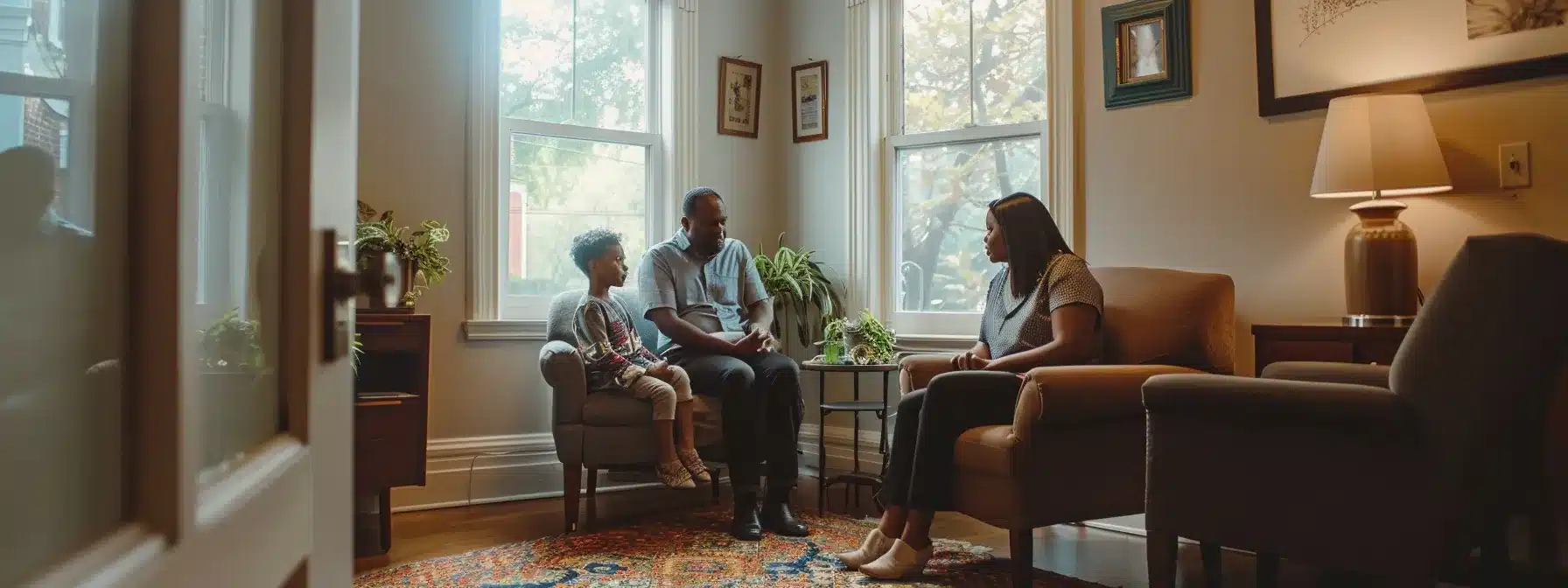From Insecure to Secure: Healing Attachment Styles Through Therapy
Healing Through Connection: The Power of Attachment-Based Therapy in DC
Do you struggle with forming and maintaining meaningful relationships? Attachment-based therapy offers a powerful approach to healing emotional wounds and improving connections with others. This article explores the principles of attachment-based therapy, its benefits for individuals and families in DC, and how it addresses insecure attachment styles. By understanding your attachment patterns and working with a skilled therapist, you can develop healthier relationships and improve your mental health. Learn how to find an attachment-based therapist in DC and maximize your therapy journey.
Key Takeaways
- Attachment theory explains how early relationships shape adult behavior and relationships
- Attachment-based therapy addresses insecure attachment styles through targeted interventions
- The therapist-client relationship serves as a foundation for healing in attachment-based therapy
- Attachment-based therapy improves emotional regulation, mental health, and relationship satisfaction
- Finding the right therapist involves considering qualifications, preparing for consultations, and understanding insurance options
Understanding Attachment Styles and Their Impact on Relationships
Attachment theory, a cornerstone of psychotherapy, explains how early caregiver relationships shape adult behavior and relationships. This section explores the four main attachment styles, their development through early experiences, signs of insecure attachment, effects on adult relationships, and cultural influences in DC’s diverse population. Understanding these concepts is crucial for addressing issues like addiction and major depressive disorder in therapy.
The Four Main Attachment Styles Explained
Attachment theory in counseling psychology, social psychology, and clinical psychology identifies four main attachment styles: secure, anxious-preoccupied, dismissive-avoidant, and fearful-avoidant. Secure attachment, characterized by healthy relationships and emotional stability, forms the foundation for effective attachment therapy. The other three styles, often associated with challenges like substance abuse or suicidal ideation, represent insecure attachments that may require professional intervention.
Individuals with anxious-preoccupied attachment often seek excessive reassurance, while those with dismissive-avoidant attachment tend to minimize emotional connections. Fearful-avoidant attachment, combining anxiety and avoidance, can lead to conflicting behaviors in relationships. Understanding these styles helps therapists tailor their approach, addressing specific attachment-related issues and promoting healthier relational patterns.
How Early Life Experiences Shape Attachment Styles
Early life experiences are crucial in shaping attachment styles, influencing how individuals form and maintain relationships throughout their lives. Psychologists, therapists, and other mental health professionals in DC recognize that the quality of care and interactions a child receives from their primary caregivers during infancy and early childhood significantly impacts their attachment patterns. These early experiences create a foundation for emotional regulation, trust, and interpersonal dynamics.
Attachment-based therapy acknowledges that disruptions in early caregiving relationships can lead to insecure attachment styles, which may manifest as difficulties in adult relationships. Health professionals in Washington, DC, utilize this understanding to help clients explore their attachment history and develop healthier relational patterns. By addressing these early experiences, mental health counselors can guide individuals towards more secure attachments and improved overall mental health.
- Secure attachment: Consistent, responsive caregiving
- Anxious attachment: Inconsistent or unpredictable caregiving
- Avoidant attachment: Emotionally distant or rejecting caregiving
- Disorganized attachment: Frightening or abusive caregiving experiences
Recognizing Signs of Insecure Attachment in Yourself and Others
Recognizing signs of insecure attachment is crucial for individuals seeking therapy in DC. Therapists often observe patterns such as difficulty trusting others, fear of abandonment, or emotional detachment in clients with insecure attachment styles. These signs may manifest in various relationships, including those with romantic partners, friends, or colleagues.
Mental health professionals and researchers, including those published on PubMed, can help individuals identify and address insecure attachment patterns. Therapists work with clients to develop healthier attachment behaviors through couples therapy or individual sessions. Although it can be confusing, most health insurance plans in DC cover therapy, making it easier for individuals to access the support they need from a qualified therapist.
The Effects of Attachment Styles on Adult Relationships
Attachment styles significantly influence adult relationships, shaping how individuals experience intimacy and romance. Those with secure attachment often form stable, trusting partnerships, while individuals with anxious or avoidant styles may struggle with fear of abandonment or emotional distance in their intimate relationships. These patterns, rooted in infant experiences, can affect communication, conflict resolution, and overall relationship satisfaction.
Therapists in DC recognize that understanding one’s attachment style is crucial for improving adult relationships. Through therapy, individuals can explore how their early experiences have shaped their current romantic patterns. This awareness allows them to develop healthier coping mechanisms, address underlying fears, and cultivate more secure attachments in their intimate relationships.
Cultural Factors Influencing Attachment Styles in DC’s Diverse Population
Cultural diversity in Washington, DC plays a pivotal role in shaping attachment styles among adults, as observed by mental health professionals grounded in John Bowlby’s attachment theory. The city’s multicultural population brings a wide range of parenting practices, family structures, and social norms that influence early attachments and, in turn, impact how individuals form relationships, express emotions, and seek support as adults.
Psychologists in DC understand the importance of considering cultural context when addressing attachment-related issues, particularly when compounded by challenges like substance use. Cultural expectations surrounding independence, intimacy, and family roles can significantly affect attachment patterns, and therapists tailor their approaches accordingly. This culturally informed perspective enhances the effectiveness of attachment-based therapy, guiding clients to navigate relationships within their specific cultural frameworks. Mental health services in DC, such as the Therapy Group of DC, often highlight culturally sensitive approaches to meet the needs of diverse communities, offering:
- Culturally-adapted attachment assessments
- Multilingual therapy options
- Community-based support groups
- Cultural competency training for therapists
The Principles Behind Attachment-Based Therapy
Attachment-based therapy in DC draws on psychological research to address developmental psychopathology and emotional challenges. This approach emphasizes the importance of love and connection in healing. The following sections explore the foundations of attachment theory, therapeutic techniques, the therapist-client relationship, and how this method differs from other approaches in psychiatry.
The Foundations of Attachment Theory in Psychology
Attachment theory, developed by psychiatrist and psychoanalyst John Bowlby, forms the cornerstone of attachment-based therapy in DC. This theory posits that early relationships with caregivers shape an individual’s ability to form secure attachments throughout life. Psychologists in DC utilize this framework to address issues such as stress, grief, and relationship difficulties, drawing on evidence from randomized controlled trials to support their interventions.
Counselors, social workers, psychologists, and other mental health professionals in DC apply attachment theory principles to understand and treat various psychological issues. By recognizing the impact of early attachment experiences on adult behavior, therapists help clients develop more secure attachment styles. This approach proves particularly effective in addressing complex emotions and interpersonal challenges, offering a path to healing through improved relational patterns.
Therapeutic Techniques Used in Attachment-Based Therapy
Attachment-based therapy in DC employs various techniques to address many types of relationship struggles and psychological trauma and strengthen the therapeutic relationship. Licensed professional counselors utilize interventions that focus on exploring early attachment experiences and their impact on current relationships. These techniques often involve creating a safe, supportive environment where clients can examine and modify their attachment patterns.
Many therapists in DC may integrate elements of cognitive behavioral therapy and family therapy into attachment-based approaches. This combination helps clients identify and change maladaptive thought patterns while addressing family dynamics that influence attachment styles. The therapeutic process often includes:
- Emotion-focused interventions
- Narrative techniques to explore attachment history
- Mindfulness exercises to enhance emotional awareness
- Role-playing to practice secure attachment behaviors
The Role of the Therapist-Client Relationship in Healing
In attachment-based therapy, the therapist-client relationship serves as a cornerstone for healing. This therapeutic alliance, grounded in the work of Mary Ainsworth, provides a secure base for clients to explore their attachment patterns. Therapists in DC foster an environment of compassion and empathy, allowing clients to experience a corrective emotional experience.
Beyond individual sessions, therapists also consider the broader context of their clients’ lives, including family dynamics and community support systems. By consistently modeling secure attachment behaviors—such as reliability, validation, and active listening—therapists help clients internalize healthier relational patterns. Over time, this therapeutic process empowers clients to cultivate stronger, more secure relationships in both personal and professional spheres, promoting overall resilience and long-term emotional well-being.
Differences Between Attachment-Based Therapy and Other Therapeutic Approaches
Attachment-based therapy, rooted in developmental psychology, focuses on how early childhood relationships shape adult emotional and relational patterns. Unlike cognitive-behavioral therapy (CBT), which primarily targets thought patterns and behaviors, attachment-based therapy explores how early attachment experiences influence the ability to form secure connections in adulthood. Research tools like the “strange situation,” developed by Mary Ainsworth, have been crucial in understanding attachment styles in children, and while it’s not used in therapy directly, the insights from this research guide therapeutic approaches for adults seeking to understand their attachment patterns.
In contrast to traditional psychoanalysis, which often focuses on unconscious drives, attachment-based therapy emphasizes the importance of relational patterns established early in life that impact emotional regulation. Therapists in DC who work from this perspective help clients recognize and modify their attachment styles to foster more secure and fulfilling relationships. Through a corrective emotional experience in therapy, clients can develop healthier ways of connecting with others, promoting long-term emotional resilience and well-being.
The Role of Connection in the Healing Process
Connection plays a vital role in the healing process of attachment-based therapy in Washington, DC. This section explores how therapeutic alliances build secure attachments, the importance of emotional safety and trust, and strategies for developing healthy relationships outside therapy. Research from Guilford Press highlights the efficacy of these approaches in addressing issues like jealousy and challenges faced by those in foster care.
Building Secure Attachments Through Therapeutic Alliances
Therapeutic alliances in attachment-based therapy provide a secure foundation for healing, addressing issues of abandonment and fostering trust. Mental health professionals in DC utilize insights from the Journal of Personality and Social Psychology to create safe spaces where clients can explore their attachment patterns. This approach, rooted in psychoanalysis, allows individuals to experience a corrective emotional bond, promoting secure attachment formation.
Gender-sensitive practices in DC’s therapy settings enhance the effectiveness of therapeutic alliances. Therapists provide tailored support, recognizing how gender influences attachment styles and relationship dynamics. By sharing relevant information and creating a nurturing environment, practitioners help clients overcome fears of abandonment and develop healthier relational patterns, regardless of gender identity. For more information on this approach, consider exploring gender therapy guidance.
The Importance of Emotional Safety and Trust
Emotional safety and trust form the foundation of effective clinical mental health counseling, particularly in addressing attachment disorders. In DC, therapists create secure environments where patients feel comfortable exploring their emotions and experiences. This sense of safety enables individuals to develop healthier coping mechanisms and work through deep-seated attachment issues. For those looking to understand more about the importance of mental health in their lives, the following resource might be valuable: why is mental health important.
Building psychological and emotional intimacy within the therapeutic relationship is crucial for healing. Mental health professionals in DC employ strategies to foster trust, allowing patients to gradually open up and engage in the therapeutic process. As trust grows, individuals become more receptive to exploring their attachment patterns, leading to improved emotional regulation and more secure relationships outside of therapy.
Strategies for Developing Healthy Relationships Outside Therapy
Attachment-based therapy in DC aims to equip individuals with strategies to develop healthy relationships outside the therapeutic setting. Therapists guide clients in recognizing patterns of aggression or abuse in their relationships, helping them establish boundaries and communicate effectively. These skills are particularly valuable in strengthening marriages and reducing the risk of relationship instability.
Mental health professionals encourage clients to practice vulnerability and express their desires in a healthy manner. By addressing underlying attachment issues, individuals learn to manage their emotions and reduce aggressive behaviors. This approach helps clients build secure, satisfying relationships characterized by mutual trust and respect, fostering long-term emotional well-being.
How Attachment-Based Therapy Addresses Insecure Attachment Styles
Attachment-based therapy in DC addresses insecure attachment styles through targeted interventions. This approach tackles anxious attachment patterns, helps overcome avoidant behaviors, and aids in healing from disorganized attachment experiences. By focusing on transforming insecure attachments into secure bonds, therapists assist clients with mood disorders, depression, and cognitive challenges. Acceptance and commitment therapy techniques are often integrated to enhance motivation and promote lasting change.
Interventions for Anxious Attachment Patterns
Attachment-based therapists in DC employ specialized interventions to address anxious attachment patterns, often tailoring their approaches to meet the unique needs of diverse populations, including LGBT clients. For example, LGBT individuals may face additional relational challenges due to societal pressures or experiences of discrimination. In these cases, interventions focus on helping clients balance the need for autonomy with the desire for secure, trusting relationships while recognizing and affirming diverse relationship structures.
Mental health professionals in DC utilize evidence-based approaches to help clients with anxious attachment styles develop greater emotional regulation and self-assurance. Individuals learn to recognize and challenge their anxious thought patterns through targeted exercises and therapeutic dialogues. This process enhances their ability to form stable, secure relationships while maintaining a strong sense of self, which is crucial for personal growth and professional success in Washington’s dynamic environment.
Addressing Avoidant Behaviors in Attachment-Based Therapy
Attachment-based therapy in DC provides effective strategies for overcoming avoidant behaviors, particularly in relationships where emotional distance is a recurring issue. Therapists often incorporate schema therapy to help clients identify and modify deeply ingrained belief systems that drive avoidant patterns, such as feelings of unworthiness or mistrust. Schema therapy focuses on healing core beliefs formed in early childhood, enabling clients to shift toward healthier relational dynamics.
Emotionally focused therapy (EFT) is another approach used to help clients with avoidant attachment, emphasizing the importance of emotional connection and security in relationships. EFT guides clients in identifying the fears that fuel their avoidance and supports them in developing the emotional awareness and vulnerability needed to build secure, trusting relationships.
Attachment-Based Therapists in DC work with clients to:
- Identify the emotional triggers for avoidant behaviors
- Challenge deeply ingrained beliefs about intimacy and connection
- Foster emotional awareness and vulnerability in a safe therapeutic setting
- Gradually build comfort with deeper emotional and social engagement
Addressing Disorganized Attachment with DBT and Attachment-Based Therapy
Attachment-based therapy in DC offers effective strategies for addressing disorganized attachment, which often manifests as inconsistent or chaotic behaviors in relationships. Individuals with disorganized attachment may struggle with both avoidant and anxious tendencies, making it difficult for them to form secure connections. Dialectical behavior therapy (DBT) techniques may be particularly useful in these cases, as they help clients develop emotional regulation and distress tolerance—two key areas where those with disorganized attachment patterns often face challenges.
Therapists integrate DBT techniques, such as mindfulness and interpersonal effectiveness, to help clients recognize and modify patterns of emotional dysregulation. By focusing on managing intense emotions and practicing healthier interpersonal skills, clients can work toward developing a more secure attachment style. This combined approach not only addresses the attachment-related issues but also helps clients manage co-occurring mental health conditions, such as trauma responses or personality disorders.
Mental health professionals in Virginia and DC collaborate to provide comprehensive support for clients with disorganized attachment. Treatment often involves:
- Identifying and addressing the emotional chaos that triggers disorganized responses
- Developing strategies for emotional regulation and distress tolerance
- Practicing vulnerability and trust in a safe therapeutic environment
- Gradually increasing emotional and relational stability
Transforming Insecure Attachments Into Secure Bonds
Attachment-based therapy in DC utilizes targeted interventions to help clients transform insecure attachments into secure, trusting bonds. Therapists work to address key factors that contribute to attachment insecurity, such as ambivalence in relationships or challenges related to gender identity. By acknowledging the unique ways these issues can shape attachment patterns, therapists create a supportive environment for clients to explore and understand their relational behaviors.
In therapy, clients are encouraged to explore the concept of kinship and connection—not just in familial terms but also in chosen relationships and communities. This broader understanding of relationships helps clients build healthier, more secure connections with others, promoting emotional resilience and well-being in both personal and professional settings.
Psychiatrists, psychologists, and other therapists in DC who practice from an attachment-based perspective utilize evidence-based techniques to help individuals overcome insecure attachment styles. Through consistent support and guided exploration, clients learn to form secure bonds, improving their overall mental health. This transformation process often involves addressing deep-seated beliefs about relationships and self-worth, leading to more fulfilling personal and professional interactions.
Benefits of Attachment-Based Therapy for Individuals in DC
Attachment-based therapy in DC offers significant benefits for individuals and families, enhancing emotional intelligence and understanding. This approach improves emotional regulation, mental health, and relationship satisfaction. It supports families through targeted interventions and is tailored to meet the diverse needs of DC’s community, including those in Dupont Circle. Therapists adhere to the Health Insurance Portability and Accountability Act while addressing individual temperaments and relational dynamics.
Improving Emotional Regulation and Mental Health
Attachment-based therapy in DC enhances emotional regulation and mental health by addressing nonverbal communication patterns. This approach helps youth develop a stronger sense of identity, reducing the risk of violence and improving overall well-being. By focusing on the underlying causes of emotional dysregulation, therapists guide clients toward healthier coping mechanisms and improved self-awareness.
Psychodynamic psychotherapy techniques used in attachment-based therapy support individuals in processing past experiences and developing more secure attachment styles. This process leads to improved emotional stability, reduced anxiety, and enhanced resilience in the face of life’s challenges. Through consistent therapeutic support, clients learn to navigate complex emotions and build stronger, more fulfilling relationships.
Enhancing Relationship Satisfaction and Communication
Attachment-based therapy in DC enables individuals and couples to enhance relationship satisfaction and improve communication skills. This approach serves as a primary intervention for those seeking therapy for anxious attachment or avoidant attachment therapy. By addressing underlying attachment patterns, therapists help clients develop more secure relational bonds, leading to increased trust and intimacy in their partnerships.
Attached-oriented mental health professionals in DC utilize anxious attachment therapy techniques to help clients express their needs effectively and manage relationship anxieties. For those with avoidant tendencies, avoidant attachment therapy focuses on building emotional connections and overcoming fears of vulnerability. These targeted interventions foster open communication, empathy, and mutual understanding, resulting in more satisfying and resilient relationships for DC residents.
Tailoring Therapy to Meet the Needs of DC’s Community
Skilled therapist in DC tailor attachment-based therapy to meet the diverse needs of the community, incorporating art therapy and counseling techniques to enhance confidence and emotional well-being. By adapting interventions to suit the unique cultural and social landscape of Washington, DC, therapists ensure that treatment resonates with clients from various backgrounds. This personalized approach improves the effect size of therapeutic outcomes, making mental health care more effective and accessible.
Therapists in DC recognize the importance of addressing specific challenges faced by the local population, such as high-stress work environments and transient lifestyles. They integrate evidence-based practices with culturally sensitive approaches to provide comprehensive mental health care. This tailored therapy helps individuals and families in DC develop resilience and stronger attachment bonds, addressing issues unique to urban living:
- Work-life balance in a fast-paced city
- Building community connections in a transient population
- Navigating diverse cultural expectations in relationships
- Managing stress related to political and social activism
Finding the Right Attachment-Based Therapist in DC
Finding the right attachment-based therapist in DC involves several key considerations. This section guides individuals through selecting a qualified professional, preparing for initial consultations, and navigating insurance options. It also highlights resources for locating specialists in attachment-based therapy, including those offering couples counseling and teletherapy services. Understanding these aspects ensures a better match between clients and therapists, such as Jeremy, LPC, for effective treatment.
What to Look for in an Attachment-Based Therapist
When seeking an attachment-based therapist in DC, individuals should prioritize professionals with specialized training in attachment theory and related therapeutic techniques, such as psychodynamic psychotherapy. Mental health services providers offering individual therapy should demonstrate a deep understanding of attachment styles and their impact on relationships. Prospective clients can inquire about a therapist’s experience with specific attachment-related issues and their approach to fostering secure attachments.
Online therapy options have expanded access to qualified attachment-based therapists in DC. Many practitioners now offer talk therapy sessions via secure platforms, allowing for flexible scheduling and increased comfort for clients. When considering online or in-person individual therapy, individuals should assess the therapist’s communication style and ability to create a safe, supportive environment conducive to exploring attachment patterns and promoting healing.
Questions to Ask During Your Initial Consultation
During initial consultations with attachment-based therapists in DC, clients should inquire about the therapist’s experience with couples therapy DC and relationship counseling DC. Questions about the therapist’s approach to addressing attachment styles in partnerships can provide insight into their expertise in marriage counseling DC. Clients may also ask about the therapist’s familiarity with specific relationship challenges common in the DC area.
Prospective clients seeking couples counseling DC or marital counseling DC should ask about the therapist’s methods for fostering secure attachments within relationships. Discussing the expected duration of therapy, frequency of sessions, and how progress will be measured is beneficial. Inquiring about the therapist’s availability for crisis interventions and their policy on between-session communication can help set clear expectations for the therapeutic process:
- What is your experience with attachment-based couples therapy?
- How do you address different attachment styles in relationships?
- What techniques do you use to improve communication between partners?
- How do you help couples rebuild trust and intimacy?
Understanding Insurance and Payment Options in DC
Navigating insurance and payment options is an important step for individuals seeking attachment-based therapy in Washington, DC. While the Therapy Group of DC does not directly accept insurance, it offers various options to make therapy more accessible. For clients facing financial challenges, the Capital Therapy Project, its low-fee training arm, provides therapy services at a lower fee. This initiative is designed to offer high-quality care at a reduced rate, making therapy more affordable for a broader range of clients.
Clients are encouraged to verify their insurance coverage for out-of-network providers and discuss payment options during the initial consultation with their therapist. SOME therapists offer flexible payment plans to accommodate individual financial situations. Open discussions about affordability can help ensure a sustainable and effective treatment plan, allowing clients to access the care they need without added financial strain.
Making the Most of Your Attachment-Based Therapy Journey
Maximizing the benefits of attachment-based therapy in DC involves setting clear goals, maintaining commitment, and applying insights to daily life. This section explores how individuals can enhance their therapeutic journey by establishing expectations, building a strong therapeutic alliance, and developing a supportive network. Understanding attachment theory and addressing underlying beliefs are key to alleviating emotional pain and fostering healing.
Setting Goals and Expectations for Therapy
Setting clear goals and expectations is crucial for effective attachment-based therapy in DC, as is the case with any therapy. Clients should work with their therapists to establish specific, measurable objectives that address their attachment-related concerns, such as improving emotional regulation or enhancing maternal sensitivity. This collaborative process helps individuals from DC and neighboring Maryland focus their therapeutic journey and track progress over time.
Therapists in DC often guide clients in developing realistic expectations for the therapy process, considering factors like personality traits and preferences and the potential need for medication. By understanding that healing attachment issues takes time and effort, clients can maintain motivation throughout their treatment. This approach allows for a more personalized therapeutic experience, addressing unique challenges while working towards improved relational patterns and emotional well-being. For more details on the variety of services offered, consider exploring the different types of therapists in Washington D.C.
Staying Committed to the Healing Process
Staying committed to the healing process in attachment-based therapy requires knowledge and adherence to treatment plans. Clients in DC benefit from understanding the principles of developmental and social psychology that underpin attachment theory, enabling them to navigate the complexities of their minds and relationships. This commitment often involves regular self-reflection and consistent application of therapeutic insights to daily life.
For individuals dealing with personality disorders or deep-seated attachment issues, maintaining dedication to the healing journey is crucial. Mental health professionals in DC emphasize the importance of patience and persistence, as progress may be gradual. Clients are encouraged to celebrate small victories and maintain open communication with their therapists, fostering a supportive environment for long-term healing. Key aspects of staying committed include:
- Regular attendance at therapy sessions
- Completing assigned homework or exercises
- Practicing new coping strategies in daily life
- Seeking support from trusted friends or family members
- Engaging in self-care activities to support overall well-being
Incorporating Therapy Insights Into Daily Life
Incorporating therapy insights into daily life is crucial for individuals undergoing attachment-based therapy in DC. Clients learn to apply concepts such as schema restructuring and eye movement desensitization and reprocessing (EMDR) techniques to manage their feelings and relationships outside of therapy sessions. This integration helps individuals with bipolar disorder or other attachment-related challenges to develop more secure patterns of interaction in their personal and professional lives.
Mental health professionals in DC emphasize the importance of consistent practice and self-reflection to reinforce therapeutic learning. Clients are encouraged to keep journals, practice mindfulness exercises, and engage in structured activities that promote healthy attachment behaviors. These practices help individuals recognize and modify maladaptive schemas, leading to improved emotional regulation and more fulfilling relationships. Key strategies for incorporating therapy insights include:
- Applying communication skills learned in therapy to daily interactions
- Practicing self-soothing techniques during stressful situations
- Identifying and challenging negative thought patterns related to attachment
- Seeking healthy support from friends and family members
- Engaging in regular self-care activities to maintain emotional balance
Building a Support Network in DC
Building a support network in DC is crucial for individuals undergoing attachment-based therapy, especially those on the autism spectrum or dealing with neurodevelopmental challenges. Mental health professionals in the city emphasize the importance of connecting with support groups, community organizations, and educational resources that focus on attachment theory and its applications. These connections can provide valuable insights into the physiological aspects of attachment and offer practical strategies for managing relationships.
DC offers numerous opportunities for individuals to expand their support network through workshops, seminars, and community events related to mental health and welfare. Many local institutions, including universities and research centers, host lectures and programs that blend neuroscience with attachment theory, providing a comprehensive understanding of attachment processes. By engaging with these resources, individuals can enhance their therapy experience and build a community that supports their ongoing growth and healing.
Conclusion
Attachment-based therapy in DC offers a powerful pathway to healing through connection, addressing deep-rooted emotional challenges and fostering secure relationships. By focusing on early life experiences and their impact on adult behavior, this therapeutic approach helps individuals and families in Washington, DC, develop healthier attachment styles, improve emotional regulation, and enhance overall mental well-being. The personalized nature of attachment-based therapy, tailored to meet the diverse needs of DC’s community, provides effective support for addressing issues such as anxiety, depression, and relationship difficulties. As individuals embark on their healing journey, finding the right attachment-based therapist and committing to the process can lead to transformative personal growth and more fulfilling connections in all aspects of life.
Ready to start your journey toward healthier relationships and emotional well-being? Reach out to the Therapy Group of DC to connect with a skilled attachment-based therapist today. Whether you’re seeking individual or couples therapy, our team is here to guide you in building more secure connections and transforming your emotional life. Contact us now to schedule your consultation and take the first step toward healing.
Frequently Asked Questions
What are the different attachment styles and how do they affect relationships?
Attachment styles, including secure, anxious, avoidant, and fearful-avoidant, shape how individuals form and maintain relationships. These patterns, developed in early childhood, influence emotional intimacy, communication, and conflict resolution in adult partnerships. Understanding one’s attachment style can lead to healthier, more fulfilling relationships.
How does attachment-based therapy help heal insecure attachment patterns?
Attachment-based therapy helps heal insecure attachment patterns by creating a secure therapeutic relationship. Through this bond, clients explore past experiences, identify unhealthy patterns, and develop new, healthier ways of relating. This process fosters emotional regulation, self-awareness, and improved interpersonal skills, ultimately leading to more secure attachments in relationships.
Can attachment-based therapy benefit families as well as individuals?
Attachment-based therapy can benefit both families and individuals. This approach focuses on strengthening emotional bonds and improving communication, which can enhance family dynamics. For individuals, it addresses attachment patterns formed in childhood, helping to heal past wounds and improve current relationships.
How do I find a qualified attachment-based therapist in Washington, DC?
To find a qualified attachment-based therapist in Washington, DC, start by searching online directories like Psychology Today or the Therapy Group of DC’s website. Look for therapists specializing in attachment theory and check their credentials. Consider reaching out for consultations to assess their approach and compatibility with your needs.
What can I expect during my attachment-based therapy sessions?
During attachment-based therapy sessions, you can expect to explore your early relationships and how they impact your current interactions. Your therapist will create a safe space to examine attachment patterns, emotions, and behaviors, helping you develop healthier connections and improve your emotional well-being.







